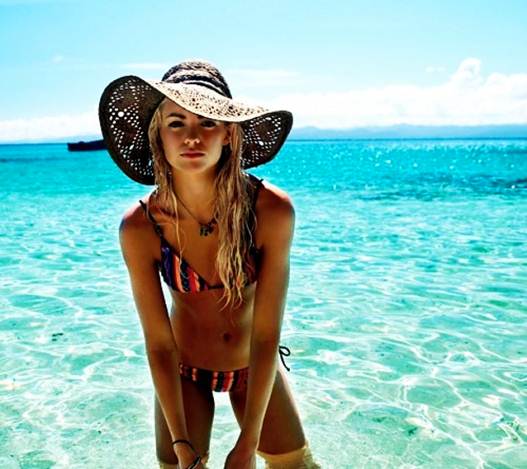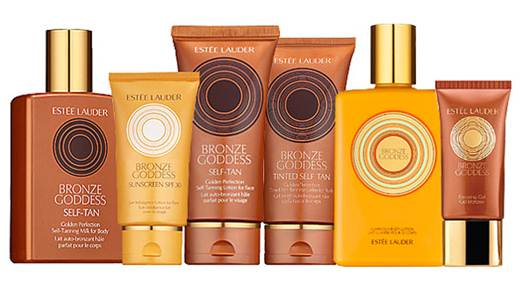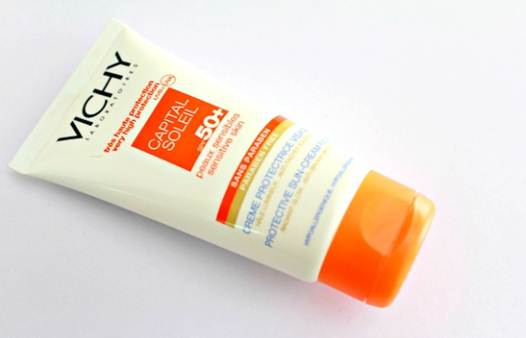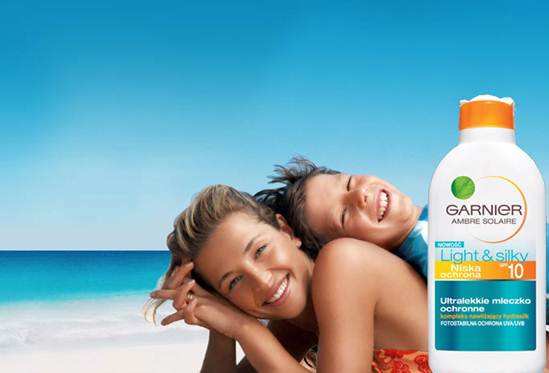If
you’re searching for a summer fragrance to evoke happy holiday memories, look
no further than the bottle of sunscreen you take to the beach, says Kathleen
Baird-Murray
There’s a
marabou walking along the beach making his morning call. He pecks at our
swimsuits drying in the sun, his soft, feathery underbelly hinting at the life
of luxury he thinks he should be leading, instead of this, minor-league stuff,
hustling tourists. He sits, his double-jointed legs folding back on themselves,
feet in front. A breeze catches the frangipani flowers in the tree nearby,
their scent wafting across. It’s hot, they reckon 420 C today. Salt
water glistens on skin, like the sun dappling on waves. The sunscreen that
started out as a thick white dollop, rubbed in until it was clear, is now a
mottled watery white. Ah yes, the sunscreen. Time to reapply.

Bronze Goddess Sun Care and Self-Tanners
And then I
wake up. It’s midday, it’s London and I’m in the
office. But for a few seconds I was transported back to Ngapali
Beach in Burma, thanks to a quick spritz of Geurlain’s
Terracotta Eau Sous le Vent, a clever fragrance because it smells just like the
Geurlain Terracotta sunscreen I used on holiday; all tiare flowers, ylang ylang, jasmine, orange flower and vanilla. It doesn’t
matter that they’re tarmacking Portobello Road outside, or that the sky is
grey. In this bottle on my desk I have the perfect escapist’s tool – a sort of olfactive “Beam me up, Scotty” – right here, right now.
(Other brands have very smartly bottled the scents of their sun screams, too,
including Clarins with Eau de Soleil and Estee Lauder
with Bronze Goddess.)
For the
beauty companies, capturing the scent of holidays has an obvious appeal.
“Fragrance, by its nature, is extremely emotionally powerful,” says Karyn Khoury, who created the
Bronze Goddess sun-care franchise for Estee Lauder. “The whole use and appeal
of it plays on the emotional connection that the wearer forms with the scent,
because the notes are very often associated with past experiences where you
were. So what more phenomenally perfect way to make that connection than where
the memory is of a happy holiday?” Amber is a the core of Bronze Goddess, “but
to give some of the vibrancy and a sense of the sun, we added zesty citrus
notes, as well as a blend of milky flowers and coconut milk – not flakes, which
are too sweet and waxy.” Available for a limited period each summer, the
original Bronze Goddess fragrance is always a sell-out.

Bronze Goddess Sun Care and
Self-Tanners
Khoury’s
happy holidays were of the beach variety; her childhood packed with visits to
Rockaway Beach (“I’m too young for the Ramones song”), a bottle of Coppertone
to hand. “I remember the smell of the ocean and as the day progresses and it
gets warmer, there is that palpable scent, the combination of the heat from the
sin and the sand, even though and doesn’t actually have a smell. There is
nothing sexier than the smell of sun-warmed skin.” Capri, the latest Bronze
Goddess fragrance, was also inspired by a recent holiday, and has more of a
citrus hit to it, with notes of muguet, lemon leaves
and a touch of patchouli. “Capri is all about the glistening sun on the water.
It’s different, the light in Europe,” says Khoury.
“Truly, I keep telling Leonard Lauder I should charge him for all my
vacations,” she laughs.
Thierry Wasser, the celebrated perfumer now at the helm of Guerlain, is acutely aware of the responsibility of
formulating the scent for sunscreens. “It makes you travel in space and time,
puts you in another place. That’s what’s so magical about scent,” he says, and
admits to taking as long to work on the Terracotta fragrance creation as on any
of Guerlain’s fine fragrances (it paid dividends:
Terracotta is arguably the most celebrated of all the beauty companies’
bronzing ranges and a large part of that is down to its evocative scent). A Piz
Buin user when younger a product that, he says,
smells “like an offspring of Shalimar”, Guerlain’s
classic fragrance Wasser let his imagination take him
to Tahiti, the inspiration for Terracotta, regretfully never having visited
himself. “It was like a little weird trip I took in my head, a fantasy of
Gauguin paintings, blue lagoons, a soft, rich, relaxing fragrance. Like a
postcard.”
If you had to conjure up a classic
sun-cream scent in your mind, you’d probably be thinking of Hawaiian Tropic.
It’s a cult favorite that, though modified, stays true to its original 1969
roots. Legend has it Ron Rice, founder and by all accounts something of a Hugh
Hefner of the sunscreen world (remember the swimsuit competitions?), mixed
coconut oil, cocoa butter, aloe and island fruit oils in a rubbish bin after
watching Hawaiian islanders rub coconut oil into their skin and hair. Job done.
According to Nathalie Broussard, scientific communications director at Vichy
Laboratories – whose classic Capital Soleil sunscreen is an addictive mix of
orange, tiare, sandalwood and iris – sun-cream scents are generally known in
the trade as “fruity-floral-solar” and focus on the “tropical” end of the
olfactory spectrum; hence the coconut and tiare flowers. We apply them, or
should do, constantly throughout a holiday, far more than we’d ever apply
perfume at home, and by the end of a trip those exotic notes are lodged in our
memories, as bound up in recollections of the holiday as the view from the
balcony and the mojitos from the poolside bar – a virtual time-machine in a
bottle, to transport us back to happy time.

classic
Capital Soleil sunscreen
These days, though, the ingredients have to
do far more than just smell nice. Clarins’s much-loved sunscreen is composed of
sesame oil, aloe, liquorice extracts, vanilla, olive leaf calendula and yellow
clover, ingredients chosen more for their protective and reparative properties
– their resultant scent being a happy coincidence. Shiseido incorporates the
same aromachology principles that it uses for its skincare, with the tea rose
and other floral notes being intentionally uplifting. Sisley goes one step
further, making the fragrances work for their place in the sunscreen formula.
Rather than consulting a particular nose, it left it to the laboratories to
focus on blending the right combination of multitasking essential oils, so you
have lavender and marjoram to soothe sun-stressed skin, geranium to boost
circulation and repel insects (no more Mosi-guard!) and sage oil to purify and
tone. The overall olfactory note is (like Clarins) found by chance, which may
be why it smells so unique (this is strictly a coconut/ tiare-flower-free
zone). Many suncare fragrances also incorporate salicylates, raw chemical
compounds that intensify white flower notes, rounding them off into magical
concoctions found in brands such as Ambre Solaire, Estee Lauder Bronze Goddess
and Dior Bronze, to name but a few. “It’s a raw material, used a lot by
perfumers, which smells like sand when the water laps over it,” explains
Laurence Liron-Taillard, fragrance development director of scent laboratory
Firmenich.

Garnier
Ambre Solaire
Generally with sun creams, familiarity
breeds comfort, rather than contempt. I’ve tried foisting upmarket, de luxe
sunscreens on normally upmarket, de luxe friends as they depart to foreign
climes, only to be politely refused. “No thanks, I’m sticking with Boots/
Nivea/ Ambre Solaire,” they say. “I always do.” It’s what they used as a child,
as a teenager, on their honeymoon and every holiday since, and now they use it
on their own children and still love it for themselves. And so off they go,
Ambre Solaire in hand, to find their own marabous, frangipani trees and
unspoilt beaches.
My own holiday long gone, one rainy day I
watch a favorite Hitcock film, Rebecca. Joan Fontaine, ever-fearful, cosies up
to Laurence Oliver, driving in the South of France before their return to Manderley:
“You know, I… I wish there could be an invention that bottled up the memory
like perfume and it never faded, never got stale,” she says. “Then whenever I
wanted to, I could uncork the bottle and… and live the memory all over again.”
You didn’t know it, Joan, but there is. It’s called sun cream.